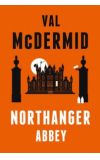
26 Mar 2014 23:40:57
So instead of reading gothic romance, for example, Catherine Morland reads Twilight; instead of letters brought in by maids, they post on Facebook, and so on. These aren't short stories or exercises in style; they are full-length novels, months of work from busy authors at the top of their game. The book itself is perfectly diverting; it follows the original plot very closely, and it is funny and brilliantly written. People who think of McDermid as a dark, intense writer will have a much lighter, jollier time – anyone who has tried to heave their way to a bar in the Assembly Rooms in August is probably experiencing something similar to a dance at the Bath Pump Rooms in the early 19th century.
But the real question is, why? Why do it? Who's it for? The world is neck-deep in Austen knock-offs, from the sensational (Bridget Jones's Diary, Clueless) to the lamentable (Austenland). As an author, she has not just been done to death, she has been pounded, repeatedly and continuously, with a stick made out of a dead horse.
Austen's beautifully observed work had much to say about the marriage market, money, love and their confluence in human emotions. And McDermid echoes it, the message being, presumably, that in the world of practicality versus passionate love – sense and sensibility – nothing ever really changes. But we know this already: from Lost in Austen, from the evergreen Andrew Davies BBC adaptations, from PD James's Death Comes to Pemberley, from every Romantic novelist who ever wrote about a grumpy but, happily, solvent man.
And simply to take the plot seems peculiar when what makes Austen so great is the voice, the insight, the feeling for humanity (this is doubly true for Northanger Abbey, which may be her funniest novel, but in plot terms isn't the most watertight). Genius is eternal. There is no need to turn a barouche into a Triumph Spitfire. What would make a much more interesting project would be to take an author venerated in their time but difficult to read now; someone should have a shot at Guillaume de Lorris.
Weirdly, in its incredibly high-stakes world of lifelong mating, and despite its constipated, joke-free prose, Twilight – the novel beloved of McDermid's Catherine Morland – has more in common with Austen than McDermid's book does. There is some delightful social skewering, and McDermid is clearly enjoying herself, but it feels as though there is nothing new to say on the subject – or so you might have thought. It is ironic that this project is happening now, at the same time as a genuinely stark, beautiful and new way of looking at Austen has appeared. That book is Longbourn, by Jo Baker, and I very much commend it to you.

